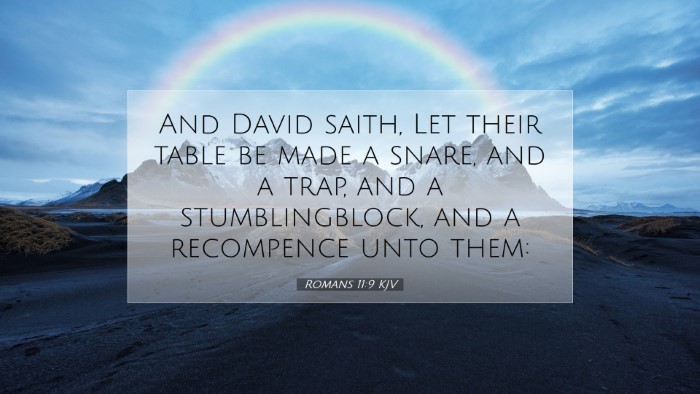Commentary on Romans 11:9
Romans 11:9 states: "And David saith, Let their table be made a snare, and a trap, and a stumblingblock, and a recompence unto them." This verse is part of the Apostle Paul's discourse on the condition of Israel, particularly regarding their rejection of the gospel and the resultant divine judgment.
Contextual Background
In the broader context of Romans 11, Paul addresses the mystery of Israel's partial hardening and the inclusion of the Gentiles into the covenant community. This chapter serves as a theological reflection on God's faithfulness toward Israel amidst their disobedience and the unfolding of God’s redemptive plan through Christ. Paul quotes from the Old Testament to support his arguments, showing continuity in God's dealings with mankind.
Commentary Insights
Matthew Henry’s Perspective
Matthew Henry emphasizes that David's statement illustrates the judgment that befalls those who reject God’s grace. He highlights that the "table" symbolizes the blessings and privileges given to Israel. When these blessings are abused or rejected, they transform into a snare. Henry remarks:
"Their own privileges turn into their ruin." This illustrates that God’s gifts, if not received with faith, can become instruments of judgment instead of blessing.
Henry further elaborates that the metaphors of “snare” and “trap” suggest that what was intended for good becomes a means of stumbling and punishment. The hardened hearts of the Israelites lead them to fulfillment of this prophecy, as they found occasion for offense in the very message of Christ.
Albert Barnes' Commentary
Albert Barnes provides a detailed exegesis of this verse, connecting it with specific historical instances of Israel’s disobedience. He states:
"David, by the Spirit, foresaw the unbelief of the Jews in the Messiah, and their rejection of Him." This prophetic warning underscores the continuity of God’s word through scripture.
Barnes connects the ideas within this verse to eternal truths about God's justice and mercy. He notes that the ultimate purpose of God's law and prophetic warnings is not merely judgment, but an invitation to repentance.
Adam Clarke’s Analysis
Adam Clarke expands on the cultural implications of the Jewish 'table.' He posits:
"The table of Judah, intended for their sustenance, becomes a means of their downfall; it serves as stark imagery of how privilege can lead to complacence."
Clarke illuminates the duality represented in the phrase "made a snare." The abundance meant for nourishment turns into a trap for those who become overly comfortable with their status before God. Clarke's insights encourage readers to reflect on their own lives, emphasizing vigilance in faith, recognizing how easily one can fall into spiritual complacency.
Theological Implications
This verse raises significant theological questions about God's justice, mercy, and the nature of human choice. It challenges believers to consider how blessings can be misused, as seen in the history of Israel.
- The Sovereignty of God: The verse illustrates God’s control over human history, where He allows conditions such that even His choicest people can reject Him.
- The Nature of Judgment: It highlights how God's patience with Israel led to a justifiable judgment when His grace was ultimately rejected.
- Invitation to All: The broader context of Romans 11 calls all believers to see that salvation is available to both Jews and Gentiles through faith.
Pastoral Applications
For pastors and church leaders, Romans 11:9 serves as a powerful reminder of their calling to both preach grace and teach accountability. Below are some applications:
- Preach Faithfulness: Lead congregations to value the grace they have received and respond obediently rather than take it for granted.
- Emphasize Dangers of Complacency: Teach that privilege within the church does not guarantee salvation; it must be coupled with genuine faith.
- Encourage Outreach: With the knowledge that the gospel can be a stumbling block, encourage believers to articulate their faith clearly to avoid unnecessary offenses.
Conclusion
Romans 11:9 offers a profound insight into the paradoxical nature of God's grace and judgment. As we glean from the wisdom of Henry, Barnes, and Clarke, we see the necessity of vigilance in faith. The admonition is clear: let us not become complacent with our spiritual heritage but engage passionately with the gospel’s transformative power.


